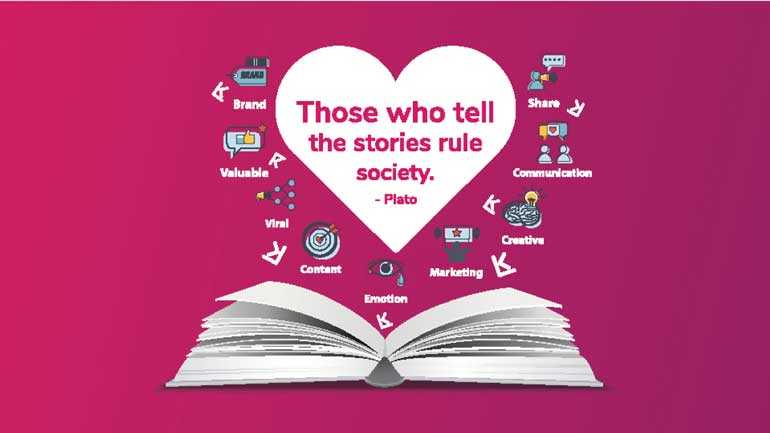Saturday Feb 21, 2026
Saturday Feb 21, 2026
Wednesday, 16 October 2019 01:07 - - {{hitsCtrl.values.hits}}

Who does not love a good story? There is something about people and stories – I love and still do recall the fine detail of stories from years ago – of Tintin and Captain Haddock of Blistering Barnacles fame, of Asterix and his Menhirs and how effortlessly he would throw them, Of Phantom and the Pygmies and their poisoned arrows and Mandrake the Magician. Of Hardy Boys and the Secret Seven. And the witty tales of Jeeves and Blandings, in the inimitable style of P.G. Wodehouse. 
Each such story which in childhood and through adulthood has boggled the mind, fed the imagination in such a way, as to weave itself firmly into memory almost as if the characters and the storylines were my own. Great stories become an intrinsic part of long-term memories – effortlessly and seamlessly.
It’s no surprise that great brands too, have the power to make their way into the hearts and memories of people through imaginative story telling. We tend to recall stories of ads much the same way, we recall characters in books or scenes from our favourite movies.
No sooner do I get introduced as a person from the advertising industry, people tell me the ads from their memories – of the famous scene where a college girl did a jig on a cricket field in a Cadbury ad or of a pug that followed a person everywhere in a Hutch Mobile TV ad.
Often brands become part of local parlance in day to day conversations such that any lady who looks younger than her age is referred to as a ‘Santoor’ lady or someone with a smiling face and gleaming teeth is given the epithet ‘the one with the Colgate smile’.
It’s not uncommon for people in parties to discuss advertising stories after downing two or three pegs. The stories evoke pleasant memories of days gone by.
Maytag has a great story at its heart. An enduring story that remained unchanged from 1967 to 2014 and brought a smile to many faces and lit up hearts at the brand’s mention.
Maytag is an appliance company that makes washing machines, refrigerators and stoves. Consumers who purchased the products in this category sought long-lasting products and reliability and after sales service. And Maytag created a beautiful story that withstood the test of time and brought a smile to your face.
The first-ever Maytag TV ad featured a training session for the Maytag repairmen. The senior trainer explained to the new engineers about the high quality machinery is equipped inside the Maytag washing machines and then said with a smile: “This is probably the last time you will ever see the insides of the machine.”
He went on to explain that the lives of the repairman at Maytag is a lonely one as no one ever calls them. The Maytag washing machine works so well and works so long that nobody ever calls the repairman.
He then went on to introduce the repairmen to their kit which included a deck of cards and other things needed to pass time. And he said the life of a Maytag repairman is very lonely indeed. Right from 1967, three people played characters that depicted the lonely repairman with cleverly tailored messages, even Christmas sales or new launches with the central message always being about the lonely repairman.
They launched a new method of stacking the refrigerator next to the washing machine with a lovely story of the bored and sleeping repairman waking up to a moment of inspiration where he explains how to stack the two. He reveals the idea in the ad and then ruefully says, ‘Loneliness, the mother of invention.’
The Maytag repairman would also have a telephone placed next to him, one which never ever rang. Then many years later in one TV ad the telephone rang, surprising the repairman and the viewer. On lifting the phone, the Maytag repairman realised to his disappointment that it was a wrong number. So the story of the lonely repairman was used to communicate the idea of dependability and reliability for brand Maytag and built a clearly differentiated entity that created great memories and loyalties among consumers.
Hallmark cards has a heart-warming story to tell. Many of us are inarticulate and don’t know how to express our inner most feelings to our near and dear ones. Hallmark cards are the way to tell people that ‘you care enough to send the very best’.
Hallmark card stories will make you cry – very often. Or at least get a lump in your throat – every single time. Because at the heart of these ads are the stories of human connections. About feelings.
It tells amazing stories through each ad. Of a mum who drops her daughter off to college. And realises that the daughter has outgrown many of the things the mum thought the daughter loved (like her favourite teddy, or family pics). She sits in her car about to leave, feeling really bad inside, then sees the hallmark card on the seat – each of them expressing in poignant detail how much the daughter loves the mum. Reading each one, the mum is in tears. She looks out of the window to find the daughter there. They hug. And the daughter says, ‘Bye mum.’
Yet another ad is set at the Christmas occasion. And a daughter tells the story of how every Christmas Eve, her dad and she would take a walk together along her frozen neighbourhood, along the lakeside and beyond the pine forests.
The ad shows the dad walking alone. And the voiceover says: “This year is the first year, I am not home for Christmas.” And then the dad opens the Hallmark Card which reads, “Miss you dad, Merry Christmas.”
The consistent storytelling. About human relationships, told in the same emotional way. Set in real human context, makes for very emotional and memorable advertising. And has helped Hallmark Cards project itself as the very best among greeting cards.
So how does storytelling fare in the new digital world? The answer is – very well indeed. In fact, irrespective of the medium the one thing that has remained a constant in creation of brands is the story telling aspect. Only the definition and description may have changed – in the social media context it’s called ‘a narrative’.
Google did one such great story to promote the search engine. The story was set in Delhi. A grandfather reminiscing to his granddaughter about his childhood friend in pre-partition India. In Lahore. And how much he misses him. The granddaughter uses Google Search, finds the person in Pakistan and arranges a surprise reunion. A tear jerker of a story but one that told a great story and is at the heart of the Google Search brand.
Brand building involves storytelling. And brand builders need the imagination and creativity of great advertising partners to build and differentiate their brands.
So, think carefully about what your brand story is and how well it’s being told. Simply put that’s what could be your biggest problem or your biggest asset.
(Santosh Menon is a marketing communications expert with 20 years of experience in multi-national locations. He can be reached at [email protected].)